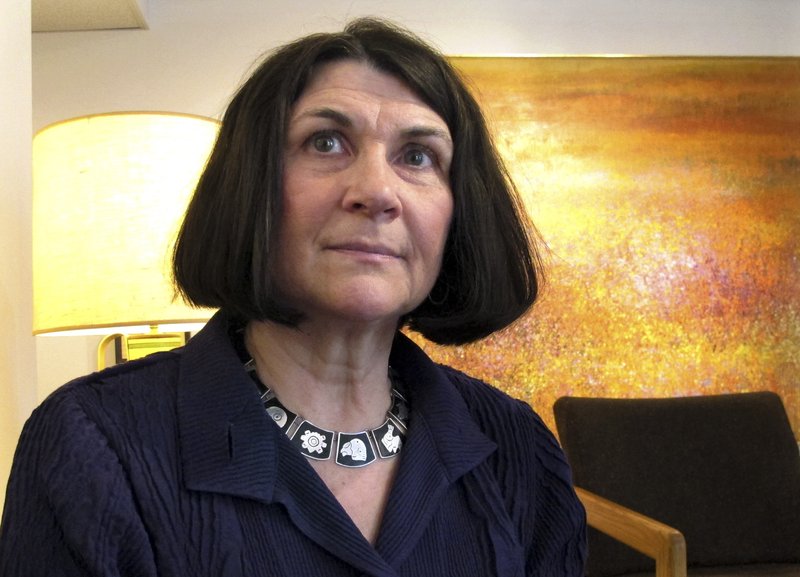University of Alabama cancels white nationalist Jared Taylor’s speaking event

Jared Taylor, a self identified white nationalist, will no longer be speaking at the University of Alabama on April 19. Taylor was invited to speak by Students for America First; a student organization at the University “dedicated to the recognition & preservation of the American ideals of self-determination, individual liberty, and constitutionally-bound democratic government as absolute necessities for prosperity.” On Monday Lee Hedgepeth, an Alabama local reporter for the New York Times posted on twitter that he had received an e-mail from the University stating that Students for America First’s registration status had been withdrawn, canceling the event. According to an email I just got from @UofAlabama, the group that had been planning to host white nationalist Jared Taylor “does not currently meet the registered student organization requirements.” Event has been cancelled. #alpolitics pic.twitter.com/l1uudlPiMR — Lee Hedgepeth (@ALPolitics) April 16, 2018 “The group had an opportunity to comply with the requirements of a registered UA student organization, but was unable to do so. If its status changes in the future, the group will be given the opportunity to re-register, gaining the privileges of registered student organizations, including the ability to host events and speakers in campus facilities,” the statement read. “For any student group to host an event through UA’s student event registration process, it must be a registered student organization, which requires, among other things, having a full-time UA faculty or staff advisor. This content-neutral policy applies to all student groups, regardless of a group’s views or the substance of its proposed event,” the statement went on to say. According to the Southern Poverty Law Center, Taylor is “the founder of the New Century Foundation and edited its now discontinued American Renaissance magazine, which, despite its pseudo-academic polish, regularly publishes proponents of eugenics and blatant anti-black and anti-Latino racists.” The University’s President, Stuart Bell sent an e-mail to staff and faculty members, in March stating that, “many in the campus community, including campus leadership, have strong feelings against the messages this person may espouse. Hate and bigotry have no place at The University of Alabama. Our community is diverse, inclusive and accepting, and we are committed to treating one another respectfully. We value the ways diversity enriches our University community.”
Jackie Robinson Day in Birmingham remembers the legendary baseball player

Michelle Clemon has been a baseball fan for only two or three years. But the Yale University product has long appreciated history. That love of history is what drew her to the Negro Southern League Museum (NSLM) for a celebration of Jackie Robinson Day. “It’s undeniable Mr. Robinson’s contribution to American history,” said Clemon, the daughter of former federal Judge U.W. Clemon. “Between my love of history and my love of sports, I’m here today to honor and recognize his contribution.” Throughout professional baseball, April 15 is designated to acknowledge the day Robinson made his debut in Major League Baseball in 1947. Initiated for the first time on April 15, 2004, Jackie Robinson Day celebrates him being the first black player of the modern era. Robinson’s debut with the Brooklyn Dodgers – now the Los Angeles Dodgers – ended some 80 years of baseball segregation. He was inducted into the Baseball Hall of Fame in 1962, remembered for his accomplishments wearing the 42 jersey. For one day, all players, coaches, managers and umpires wear 42 on their uniforms. The Parkside District was the central point of the celebration in Birmingham, with festivities at the museum and recognition at Regions Field as the Birmingham Barons hosted the Montgomery Biscuits. Birmingham Mayor Randall Woodfin was on hand for a program at the NSLM. “I think we need to remember the connection of racial barriers that Jackie Robinson broke down,” he said. “It started the movement for African-Americans across the entire nation. Not just sports but in all accommodations and walks of life to make sure there was equal opportunity.” Ron Jackson, a Birmingham native who played in the Major Leagues, said Robinson paved the way for everybody. He added a “tip of my hat” to the late player’s wife. “She had to be there, too, and take it in the stands and hear all the bad things they said about her husband.” Galvin Billups of Trussville was at the museum with his sons Caleb, 7, and Micah, 4. He said Jackie Robinson Day is significant as a chance to memorialize Robinson. “I get to teach my children his contribution and have a sense of black pride,” he said. James Robinson, also of Trussville, was there with his sons Brandon, 9, and Jonathan, 6. He said Brandon read a book about Robinson and picked his number 42 for his youth baseball jersey. “He loved the Jackie Robinson story and how hard he worked to get where he wanted to be,” the father said, “and how he transcended the sport.” Leroy “Pirate” Miller Jr. is a former Negro Leaguer who played with the Birmingham Black Barons and the Philadelphia Stars. “It seems like it’s more important today than it was back in the past,” the Leeds resident said. “This is a great day for all blacks to have a chance to really know something about baseball and where you’ve come from.” But Jackie Robinson Day was not solely celebrated by blacks. Mountain Brook’s Jacob Ray was at NSLM with his 8-year-old son, Shep. It was their first time there and the father said he was blown away. “It is absolutely amazing,” he said, adding that he grew up playing baseball and now coaches his son. “We’re right in the middle of the season, and what better way to celebrate Jackie Robinson Day than to come down here. “The history – not just baseball but race relations in general – is a big part of educating my son,” Ray said. “His Cub Scout troop went to the civil rights museum a few months ago, so he’s already in tune to that and interested in it. This is another chapter in that. To intertwine that with baseball is important for me to pass on to him. That’s a big reason we came out.” Jeremy Davis made the drive down from Huntsville with his family – wife, Tiffany, and sons Jackson, 11, and Jamison, 7. He would not have missed this event. “I’m a white man and I am married to an African-American woman and we have two biracial children,” he said. “It’s important for them to grow up and know both sides of their culture and where baseball began.” Next door at Regions Field, the Barons honored two guiding leaders for social change. One – Martin Luther King Jr. – raised his voice; the other – Robinson – raised his bat and glove. The Barons had planned to honor the 55th anniversary of King writing his “Letter From Birmingham Jail” on Saturday by wearing commemorative jerseys with text from that letter. The game was rained out and played Sunday as the opener of a doubleheader. The home team wore the MLK jerseys in Game 1 – a 2-1 Barons victory over the Biscuits. They changed to blue 42 jerseys for the nightcap, which the Barons lost 9-2. As the Barons warmed up for Game 2, 14-year-old Ethan Burnett of Pelham sat along the first base line. He yelled, “Hey, 42,” appealing for a Barons player – any player – to come his way. In the third inning of the game, an interesting exchange was heard in the media room. “We’ve got a guy warming up in the bullpen,” Barons’ staffer Stacy McGehee said. “Any idea who that is?” “Number 42,” fellow staffer Scott Roby replied. “He’s a right-hander.” For the record, it was Connor Walsh. The MLK jerseys, autographed by Barons players, were available at auction. Republished with the permission of Alabama Newscenter.
Five members of Alabama delegation receive award for conservative excellence

The American Conservative Union Foundation (ACUF) on Monday released its 47th Annual Federal Ratings of Congress. Five members of the Alabama delegation were awarded the ACUF’s Award for Conservative Excellence based on their voting records. Annually the ACUF — the sister organization of the American Conservative Union (ACU), the nation’s original conservative organization. For more than fifty years the ACU has educated and activated the conservative movement through its ratings programs, policy centers and educational events such as the Conservative Political Action Conference (CPAC), the largest annual gathering of conservatives in the nation — produces a scorecard for members of both the U.S. Senate and House of Representatives based on their voting records. All members of Congress are issued a score while only members who received a score of 80 percent or higher receive an award. Awards were presented to — 1st District U.S. Rep. Bradley Bryne (92.15%); 4th District U.S. Rep. Robert Aderholt (83.6%); 5th District U.S. Rep. Mo Brooks (90.13%); 6th District U.S. Rep. Gary Palmer (100%); as well as former U.S. Sen. Luther Strange (81.82%) for his brief stint in the U.S. “In the 2017 session, we saw Republicans come together to pass the most important corporate tax reform in decades, confirm a true conservative in Neil Gorsuch to the Supreme Court, and repeal the Obamacare individual mandate,” said ACU Chairman Matt Schlapp. “But conservatives must not rest on their laurels. This is not the time for four corners defense. Congress must pass a rescissions bill to eliminate wasteful spending in the omnibus and finally confirm highly qualified presidential nominees to critical positions.” This year some of the key issues ACU Foundation scored include: confirmation of Neil Gorsuch to the Supreme Court repeal of Obamacare passage of comprehensive tax reform defunding of Planned Parenthood repeal of Dodd-Frank and key presidential nominations to cabinet positions. Widely regarded as the “gold standard” of conservative scoring, the ACU “Ratings of Congress” evaluated 21 key votes in the U.S. Senate and 25 key votes in the U.S. House of Representatives. The bills are selected cover a variety of issues and are designed to reflect how each individual views the role of government in another individual’s life. Some of the bill topics included are social and cultural, fiscal and economic, and national security. This year marks the ACU’s 47th year of rating key votes in Congress. Read each member’s individual score and breakdown below:
AL.com’s John Archibald wins Pulitzer Prize in commentary

John Archibald, an editorial writer at the AL.com, was named today a Pulitzer Prize winner for commentary Monday afternoon at Columbia University during the announcements for journalism and arts winners for 2018. Archibald was awarded the prize “for lyrical and courageous commentary that is rooted in Alabama but has a national resonance in scrutinizing corrupt politicians, championing the rights of women and calling out hypocrisy,” said the Pulitzer Prize website. Archibald’s commentaries encompassed everything from from the scandal and resignation of former Gov. Robert Bentley to the contentious special election between former Ala. Chief Justice Roy Moore and former U.S. Attorney Doug Jones. Archibald is a columnist for the Alabama Media Group, with his work appearing in the Birmingham News, the Huntsville Times, Mobile’s Press-Register, AL.com and its probing social brand, Reckon. Before he began his column in 2004, he worked on the News’ investigative team and has covered everything from crime and punishment to Birmingham City Hall. He grew up in North Alabama and graduated from the University of Alabama in 1986. He is married with three grown children.
Walt Maddox unveils plan to tackle Alabama’s growing opioid crisis

Tuscaloosa mayor and Democratic gubernatorial candidate Walt Maddox on Monday unveiled his plan to tackle growing Alabama’s opioid epidemic. “Like most states, Alabama has been hit hard with opioid abuse and addiction. Indeed, our state has the highest rate of prescription opioid use in the nation, and it’s well established that legitimate use of opioid medication is a leading cause of illicit opioid abuse. But opioids aren’t our only drug problem,” explained Maddox. In an effort to get to the root of the problem, Maddox will separate substance abuse out from under the Department of Mental Health and create a cabinet level officer who answers directly to the Governor “in the battle to save our state from the ravages of illegal drug use while continuing to coordinate drug policy with mental health resources so that underlying causes of addiction are addressed.” He also reiterated the need to expand Medicaid to tackle the opioid epidemic. “The expansion will increase the availability of and access to treatment and counseling that we so desperately need. We also need to improve prescription drug monitoring and make medical treatments more widely available, like Soboxone, which alleviates the pain of opioid withdrawal but is too expensive for most to afford without assistance,” Maddox said in a statement He continued, “The opioid epidemic is also a time for society to look inward and reflect on how our past reaction to problems, like the crack cocaine scourge of two or three decades ago that disproportionately affected African American communities, was to enhance law enforcement and criminal penalties.” “The ‘war on drugs’ was never an effective strategy to treat substance abuse. Today we see a more compassionate, treatment-based approach to fighting opioids, which are devastating white and black communities alike. It’s terrible that it takes a growing tragedy in white communities to help us see the truth of what’s been happening in all our communities for many years, but the fact is that substance abuse has always been first and foremost a public health problem that cannot be solved by the criminal justice system alone. We’ve not always treated it that way, and that must change.”
Donald Trump builds on Barack Obama opioid policy

Deep within President Donald Trump’s plan to combat opioid abuse, overshadowed by his call for the death penalty for some drug traffickers, is a push to expand the use of medication to treat addiction. It’s a rare instance in which Trump isn’t trying to dismantle Obama administration policies, and where fractious Republicans and Democrats in Congress have come together. Trump declared last month that “we’re making medically assisted treatment more available and affordable,” even as Congress was working to approve $1 billion for a new treatment grant program for opioids as part of the massive government funding bill. Not to offer such treatment is like “trying to treat an infection without antibiotics,” new Health and Human Services Secretary Alex Azar told the National Governors Association earlier this year. Experts have long argued that medication-assisted treatment should be the standard of care for people addicted to heroin and other opioid drugs. But acceptance lags. Cost is a barrier, as are government regulations. Some of the medications are opioids themselves and there’s no consensus on how long patients should remain in treatment. In its final year, the Obama administration pushed through Congress $1 billion for opioid crisis grants to states. Of that, $500 million was to be released last year and the other $500 million this year. States had to show that their opioid programs are based on clinical evidence, so medication-assisted treatment got a big boost. The 2018 spending bill provides another $1 billion, and the Trump administration says it will carry even more specific requirements for states to use treatment supported by clinical evidence, including medications. “The government is talking about treatment and medication-assisted treatment in a way that the government has never done before,” said Tom Hill, vice president of addiction and recovery at the National Council for Behavioral Health, which advocates for mental health and addiction treatment. Overdose deaths from heroin, synthetics like fentanyl, and prescription painkillers, reached 42,000 in 2016, according to the latest statistics. “This is being addressed as the illness that it is,” said Elinore McCance-Katz, assistant secretary of HHS for mental health and substance abuse. “Most definitely the government is acknowledging the disease of addiction as it pertains to opioids — and other substances as well — but opioids of course are an emergency.” Grants are awarded to states based on a variety of factors, including overdose deaths and the number of people who can’t find treatment. A study looking at New England by the nonprofit Institute for Clinical and Economic Review found that every dollar invested in medication treatment would return about $1.80 in savings, when factoring in society’s costs from lost productivity and crime. Vermont has been hard hit by the addiction epidemic and is among states that have previously gotten federal money for medication-assisted treatment. Its central goal is to improve access, according to a federal report. In Massachusetts, the plan is aimed in part at pregnant women and new mothers. Indiana wants to focus on rural residents. One Vermont physician, Dr. Deborah Richter, says medications have helped her patients, especially when combined with counseling. “People got back to what they were before the addiction seized them,” she said. As a doctor, “it was on a personal level so rewarding to save other mothers’ children.” Skeptics of the government emphasis on medication-assisted treatment say it’s not a cure-all. Jonathan Goyer, manager of the Anchor recovery program in Pawtucket, Rhode Island, said he sees many patients who don’t want to take medication, because they want to be free of drugs altogether. “We should be increasing medication-assisted treatment,” said Goyer. “But we should also be increasing everything else.” At the Neil Kennedy Recovery Centers in Youngstown, Ohio, outpatient director Pam Ramsey said her program emphasizes medication as an aid, not as the sole treatment. “It really is an assist to the treatment,” said Ramsey. Along with medication, treatment incorporates a version of the traditional 12-step approach to quitting, counseling sessions, group meetings, and follow-up. “Our goal is still abstinence.” Home remodeling contractor Rob Judy said he’s wrestled with heroin addiction for more than 20 years. Medication alone did not keep him drug free, nor did a faith-based program. Finally Judy signed up for comprehensive treatment at Neil Kennedy. The medication puts out “the fire of active addiction, of having to wake up and use,” said Judy. But he says that needs to be followed with counseling, peer support and follow-up care. “I believe that addiction is based on and driven by loss, and at the core of it is pain,” said Judy. “If you don’t address those issues, sooner or later you’re going to relapse.” Republished with the permission of the Associated Press.
Social media pages help members share local Alabama history

When Alan Clark called Allen Jones about seven years ago to put together a Facebook page so their Dothan High classmates could post about their memories of Dothan, Jones thought they might end up with two or three hundred members. “Old Dothan AL Memories” currently has more than 8,000. “It just grew,” Jones said. “By and large, I think it’s turned out to be a real good thing. We’ve got all kinds of people on there now.” Jones and Clark are the page administrators. Both graduated from Dothan High in 1973, Clark the class president and Jones the Student Government Association president. Jones lives in Albuquerque, New Mexico, and spends about 10 or 15 minutes a day monitoring posts and evaluating membership requests. “We’ve got a lot of people that want to join,” Jones said. “I have to be careful because sometimes it’s people wanting to get access to that big of a group to sell something or Lord knows what.” Periodically he warns people that if somebody calls or emails them saying they’re an old friend from Dothan, it may or may not be true. “Somebody could get on that website for a couple of hours and get pretty knowledgeable about some old Dothan stuff,” Jones said. Like any social media page, content is driven by what members post. With the increase in recent years of websites focused on history, the Facebook page is another tool for learning about Dothan. “Ray Hutto and Frank Gaines have been a great source of some of the pictures and some of the memories there,” Jones said. “Robert Register is a historian. He jumps on there a lot.” Hutto, a retired Dothan firefighter, has been interested in local history most of his life. When he worked as an inspector with the fire department in the late ’70s and early ’80s, he went inside every business in town. He has his own Facebook page titled “Some siftings of Ray Hutto” that includes photos, documents, clippings, ads, postcards, information and items he ran across while doing genealogy over the years. “I traveled all over the Southeast researching my family,” he said. “We’re originally from South Carolina, came from Germany in 1735.” The research took time and effort, but for Hutto it was a learning experience. In those days, genealogy was done with books and documents, some on microfilm or microfiche. The downtown library has the Dothan Eagle on microfilm but doesn’t have an index. That often meant looking for articles and photos with few clues on exactly where to look. “I spent many, many hours in that library on that machine before they came out with computers,” Hutto said. Hutto subscribes to Ancestry.com, Newspapers.com, and other websites that have resources and tools that make it easier to find records and information about people, places and things. Many family trees have already been documented. It’s a timesaver for genealogy, history and other research. While a lot of information is posted online, Facebook offers the chance to directly ask people for details. Questions and photos prompt discussions. A recent inquiry on “Old Dothan AL Memories” about the King’s Inn restaurant and lounge yielded more than four dozen responses. Sometimes members answer questions with links to websites that provide detailed information. It’s the exchange of ideas by people with knowledge of the subject that makes the responses intriguing. “You could never communicate if you didn’t have this social media,” Hutto said. Hutto likes sharing the hundreds of postcards he’s amassed over the years. Besides posting them online, he’s enlarged and mounted some on foam which he uses when he speaks to civic, church and senior citizen groups. He finds postcards of downtown Dothan and local buildings, many of which have since been torn down, on eBay. Sometimes the message on the postcard is more interesting than the picture. A 1945 postcard from a woman who passed through Dothan heading south asked someone to write her husband asking him to go through with the divorce as fast as he could. “I love someone else now,” she wrote. “A lot of these I buy not for the front but for the back,” Hutto said. Republished with the permission of the Associated Press.
Celebrating John Archibald’s Pulitzer while mourning the lack of talent in most newsrooms

Journalism is a strange beast. I’ve thought that for years, even before I started on this crazy adventure that is Alabama Today. What I want from those covering hard news is facts. What I want from a columnist is a fact-based argument or story with an emotional or personal hook. I don’t just want to read your opinion; I want your opinion to move me even if the emotion I feel isn’t a positive one. AL.com’s, or more aptly Alabama Media Group’s, John Archibald nails that nearly every time. Which is why he deserves his newly minted Pulitzer Prize. I like to think that my news taste are like most readers or consumers. What I want from a news story is straight down the middle, facts. If I can tell what the reporter thinks about a particular subject by time I’ve reached the end of an article, then I feel as though they have failed. If I get to the end of an article and have to pause to reflect upon my own position, or consider the story to be just a neutral factual telling of events, then the reporter has done their job. Most days I can simply look at the headline, the by-line, read a lede, and can guess exactly where the reporter is headed with their story and how they feel personally about the topic. That’s what I consider a failure by both the reporter and the outlet running their story. One of my favorite reporters of all time (doesn’t everyone have favorite reporters?) is Brendan Farrington of the Florida bureau of the Associated Press. I’ve known Brendan personally and professionally for many years, and yet I still have no idea what his politics are. That’s a dang good reporter. When I was in Florida I read nearly every story he wrote because I knew that it would do exactly what journalist are taught to do in school: write straight down the middle. Wait, are they still taught to report straight down the middle? Hard to tell these days. I resent the current state of journalism where news stories and content is heavily weighted with bias; which is part of the reason I started this site. Journalism is hard which is why it’s a profession that used to be revered instead of mocked. It’s hard to explain a topic or situation and stay reasonably objective from your own opinions when writing. Beyond that, good journalists live by an ethics code whereby they have a duty to the public to be honest and loyal, even when they fundamentally disagree. Frankly those with the skills to do so can usually avoid journalism altogether and take jobs paying better money elsewhere. A good journalist is like a good teacher they do it for the love of the job not the accolades or pay. In fact, Mike Rosenberg of the Seattle Times yesterday tweeted, “One of today’s Pulitzer winners has already left the paper to run a brewery’s social media account. This is at least the 4th Pulitzer winner since 2015 who left for PR by the time they won. PR pays 2x more & has much more job security than journalism.” Nevertheless I believe readers need to demand more from Alabama’s newsrooms. While I do realize I live in a football state — football, crime and feature fluff-stories dominate the majority of content across most well-trafficked Alabama sites these days. I mean I love knowing the best place for burgers, hotdogs, nails, blah, blah, blah, but I find the constant lists and photo galleries lacking. I get it. That stuff makes for great click-bait, but no one’s winning a Pulitzer for 99% of the content showing up on news sites these days. And when there is award-winning journalism happening in our state, how could one be expected to find it in the stream of constant shhhhhhttuff. Back to what got me writing about the state of things, Alabama’s own John Archibald, his column nails it, most days. Even when I don’t agree with what he’s writing, which is fairly frequent, I appreciate his investigative skills, his passion and his consistency. I appreciate that every column is well-researched, well-cited and covers every base a real journalist should. He doesn’t traffic in click-bait or TMZ style gossip. Lord knows there’s plenty of that around the state to publish if he was so inclined. He focuses on issues that matter. He shapes conversation and leaves those skirting the law or ethics rightfully shaking in their boots. I know a handful of people celebrating John’s win and you can count me among them. He’s the best in Birmingham and probably in Alabama. It’s is a well-deserved award. I just wish Alabama had more of them coming our way.
Doug Jones supports Donald Trump actions on Syria

Alabama Senator Doug Jones released a statement via Facebook on Saturday, supporting President Donald Trump’s actions against Syria. “Bashar al-Assad‘s repeated use of chemical weapons on innocent civilians – so many of them children – was an atrocity and must be stopped,” said Jones. “I fully support the President’s actions last night to strategically target Assad’s capacity to use chemical weapons, and to do so with the assistance of our allies. It is my hope, as General Mattis stated last night, that Assad gets the message this time and that further action, which should be done with Congressional approval, will not be necessary.” “Finally, I am grateful for the capable service of the Alabama airmen who supported this mission in Syria last night. To them and their families, I share my continued appreciation for their sacrifices on behalf of all of us.” Jones released his statement after the United States, United Kingdom, and France used targeted airstrikes on several targets related to Syria’s chemical weapons program. The strikes came six days after Syrian President Bashar al-Assad’s forces used chemical weapons against civilians outside of Damascus. Activists and doctors Syria published images of men, women, and children with foam coming out of their mouths and noses; doctors saying that they were exposed to a nerve agent. The attack killed at least 42 adults and children. Trump tweeted on Saturday that the airstrike was “A perfectly executed strike last night. Thank you to France and the United Kingdom for their wisdom and the power of their fine Military. Could not have had a better result. Mission Accomplished!” A perfectly executed strike last night. Thank you to France and the United Kingdom for their wisdom and the power of their fine Military. Could not have had a better result. Mission Accomplished! — Donald J. Trump (@realDonaldTrump) April 14, 2018 While most Republican lawmakers applauded the President’s actions, Democratic lawmakers have varying opinions. Virginia-Democratic Sen. Tim Kaine said Trump’s actions were “illegal” because he proceeded with approval from congress. House Minority Leader California-Democrat Nancy Pelosi said that although Assad’s chemical weapons attack was a “brutally inhumane war crime that demands a strong, smart and calculated response.” Trump needs to present a more comprehensive strategy on Syria to Congress and seek lawmakers’ approval in order to move forward.
Martha Roby: Always fighting for Fort Rucker and Maxwell AFB

The recent district work period provided me valuable time on the road in Alabama’s Second District to have in-person meetings with many of the people I represent in Congress. I firmly believe that hearing directly from you and having face-to-face conversations about the issues that impact our community daily enables me to be a better representative for your priorities in Washington. As you know, our district has a very large military footprint and is home to two of the finest military installations in the country – Fort Rucker and Maxwell-Gunter Air Force Base. It is critically important that I stay up-to-date with the needs and priorities of our military bases, so during the last district work period I met with leadership at both installations. I recently spoke on the House floor to share an update about my visits. At Fort Rucker, I was thoroughly briefed by General William Gayler, and I truly appreciate him for taking the time to talk with me. At Maxwell, I was given the opportunity to speak to the Squadron Officer School, and then I had a productive meeting with Lt. General Anthony Cotton, Commander of Air University. This vital operation serves as our Air Force’s center for professional military education. As a member of the Defense Appropriations Subcommittee, properly funding our military is one of my top priorities. As I told General Gayler and Lt. General Cotton, I remain committed to ensuring that our district’s large military footprint continues to have the resources necessary to carry out their important missions. Earlier this month, Maxwell-Gunter Air Force Base celebrated 100 years of operation – what a remarkable milestone. Their weekend-long celebration included a military tribute at a Montgomery Biscuits baseball game and a 5k race. Additionally, students from local schools participated in an art and essay contest themed “100 Years of Leadership in Airpower.” I’m confident that I speak for the entire Second District by saying that we appreciate all that these men and women do for our country and our community. I know our region looks forward to many more years of continued partnership with Maxwell. The outstanding individuals who work there truly invest so much in our state. I will always work to ensure that Fort Rucker and Maxwell-Gunter Air Force Base remain strong components in our national defense infrastructure. Over the last year, I have greatly appreciated finally working alongside an Administration that has demonstrated an unwavering commitment to rebuilding our military after years of damaging cuts. I am proud to serve as the representative for these two fine military installations, and I will continue to fight to provide the brave men and women of our military with the best possible resources to ensure they are well prepared for whatever challenges they may face as they work to keep us safe. It is truly a great honor and privilege to be an advocate for Fort Rucker and Maxwell-Gunter Air Force base in Congress. I will never stop fighting on behalf of our service members and their families. ••• Martha Roby represents Alabama’s Second Congressional District. She lives in Montgomery, Alabama with her husband Riley and their two children.

